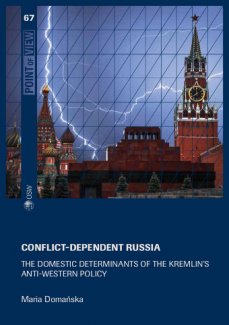Conflict-dependent Russia

The Kremlin’s foreign policy is subordinate above all to the domestic political aims of the ruling elite. The most important of these is the maintenance and legitimistaion of the Chekist-kleptocratic model of feudalism. In this model, which is fundamentally opposed to the Western model of liberal democracy, the state is the de facto property of a small group of decision-makers, and the rules of international interactions are dictated by the logic of the ‘zero-sum game’.
The Kremlin’s confrontational approach to the West – at the political, economic, social and propaganda levels – is not a transitional phenomenon, but rather a permanent, strategic Leitmotiv of Russia’s foreign policy. It results from the intrinsic features of the Russian authoritarian regime, and from the mentality of the ruling elite included within it. The latter is largely a product of a particular type of society and of the specific path of the state’s historical development. In such conditions, is any real normalisation of relations between Russia and the West possible?




